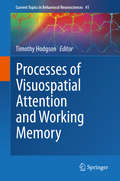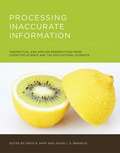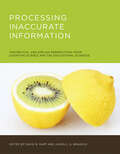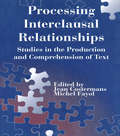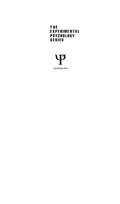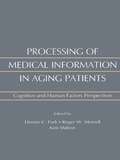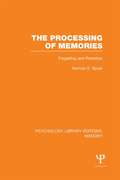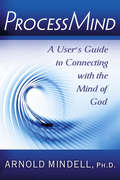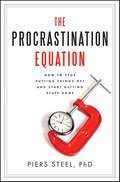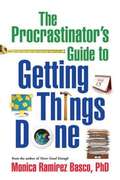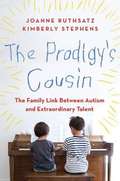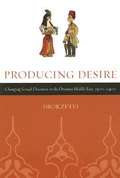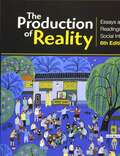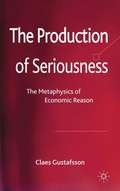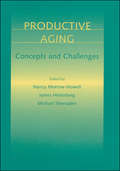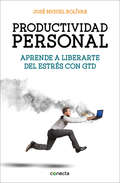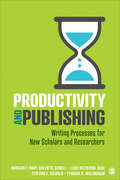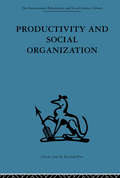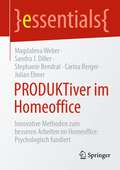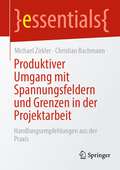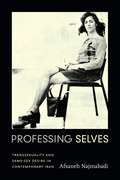- Table View
- List View
Processes of Visuospatial Attention and Working Memory (Current Topics in Behavioral Neurosciences #41)
by Timothy HodgsonThis volume covers a broad range of current research topics addressing the function of visuospatial attention and working memory. It discusses a variety of perspectives ranging from evolutionary and genetic underpinnings to neural substrates/computational processes and the connection between attention and working memory. Contributions address the topic at the molecular, system and evolutionary scales and will be of interest to a range of audiences from animal behaviour specialists, experimental psychologists to clinicians in the field of psychiatry and neurology.
Processing Inaccurate Information
by Jason L.G. Braasch David N. RappOur lives revolve around the acquisition of information. Sometimes the information we acquire -- from other people, from books, or from the media -- is wrong. Studies show that people rely on such misinformation, sometimes even when they are aware that the information is inaccurate or invalid. And yet investigations of learning and knowledge acquisition largely ignore encounters with this sort of problematic material. This volume fills the gap, offering theoretical and empirical perspectives on the processing of misinformation and its consequences.The contributors, from cognitive science and education science, provide analyses that represent a variety of methodologies, theoretical orientations, and fields of expertise. The chapters describe the behavioral consequences of relying on misinformation and outline possible remediations; discuss the cognitive activities that underlie encounters with inaccuracies, investigating why reliance occurs so readily; present theoretical and philosophical considerations of the nature of inaccuracies; and offer formal, empirically driven frameworks that detail when and how inaccuracies will lead to comprehension difficulties.ContributorsPeter Afflerbach, Patricia A. Alexander, Jessica J. Andrews, Peter Baggetta, Jason L. G. Braasch, Ivar Bråten, M. Anne Britt, Rainer Bromme, Luke A. Buckland, Clark A. Chinn, Byeong-Young Cho, Sidney K. D'Mello, Andrea A. diSessa, Ullrich K. H. Ecker, Arthur C. Graesser, Douglas J. Hacker, Brenda Hannon, Xiangen Hu, Maj-Britt Isberner, Koto Ishiwa, Matthew E. Jacovina, Panayiota Kendeou, Jong-Yun Kim, Stephan Lewandowsky, Elizabeth J. Marsh, Ruth Mayo, Keith K. Millis, Edward J. O'Brien, Herre van Oostendorp, José Otero, David N. Rapp, Tobias Richter, Ronald W. Rinehart, Yaacov Schul, Colleen M. Seifert, Marc Stadtler, Brent Steffens, Helge I. Strømsø, Briony Swire, Sharda Umanath
Processing Inaccurate Information: Theoretical and Applied Perspectives from Cognitive Science and the Educational Sciences (The\mit Press Ser.)
by Jason L.G. Braasch David N. RappInterdisciplinary approaches to identifying, understanding, and remediating people's reliance on inaccurate information that they should know to be wrong.Our lives revolve around the acquisition of information. Sometimes the information we acquire—from other people, from books, or from the media—is wrong. Studies show that people rely on such misinformation, sometimes even when they are aware that the information is inaccurate or invalid. And yet investigations of learning and knowledge acquisition largely ignore encounters with this sort of problematic material. This volume fills the gap, offering theoretical and empirical perspectives on the processing of misinformation and its consequences.The contributors, from cognitive science and education science, provide analyses that represent a variety of methodologies, theoretical orientations, and fields of expertise. The chapters describe the behavioral consequences of relying on misinformation and outline possible remediations; discuss the cognitive activities that underlie encounters with inaccuracies, investigating why reliance occurs so readily; present theoretical and philosophical considerations of the nature of inaccuracies; and offer formal, empirically driven frameworks that detail when and how inaccuracies will lead to comprehension difficulties.ContributorsPeter Afflerbach, Patricia A. Alexander, Jessica J. Andrews, Peter Baggetta, Jason L. G. Braasch, Ivar Bråten, M. Anne Britt, Rainer Bromme, Luke A. Buckland, Clark A. Chinn, Byeong-Young Cho, Sidney K. D'Mello, Andrea A. diSessa, Ullrich K. H. Ecker, Arthur C. Graesser, Douglas J. Hacker, Brenda Hannon, Xiangen Hu, Maj-Britt Isberner, Koto Ishiwa, Matthew E. Jacovina, Panayiota Kendeou, Jong-Yun Kim, Stephan Lewandowsky, Elizabeth J. Marsh, Ruth Mayo, Keith K. Millis, Edward J. O'Brien, Herre van Oostendorp, José Otero, David N. Rapp, Tobias Richter, Ronald W. Rinehart, Yaacov Schul, Colleen M. Seifert, Marc Stadtler, Brent Steffens, Helge I. Strømsø, Briony Swire, Sharda Umanath
Processing interclausal Relationships: Studies in the Production and Comprehension of Text
by Jean Costermans Michel FayolDuring the last 10 years, more and more linguistic and psycholinguistic research has been devoted to the study of discourse and written texts. Much of this research deals with the markers that underline the connections and the breaks between clauses and sentences plus the use of these markers -- by adults and children -- in the production and comprehension of oral and written material. In this volume, major observations and theoretical views from both sides of the Atlantic are brought together to appeal to a wide range of linguists, psychologists, and speech therapists. The volume presents contributions from researchers interested specifically in adult language and from others concerned with developmental aspects of language. Some contributors deal primarily with production, whereas others concentrate on comprehension. Some direct their attention to oral discourse while others focus on written texts. To preserve overall coherence, however, the contributors were given the following recommendations: * With regard to the level of linguistic analysis, the emphasis should be on the clause level -- more particularly, on the relationships between clauses. * Special emphasis should also be placed on linguistic markers (e.g., connectives, markers of segmentation, punctuation). * An overview of a given field of research should be offered, and current research should be put into perspective. * For contributors in the developmental field, attention should be paid to the fact that an account of the acquisition of some language functions throughout childhood should be included only if general principles of interclause relations that might be masked by the exclusive examination of adult evidence could be derived from it.
The Processing of Information and Structure
by W. R. GarnerFirst published in 1974. Routledge is an imprint of Taylor & Francis, an informa company.
Processing of Medical information in Aging Patients: Cognitive and Human Factors Perspectives
by Denise C. Park Roger W. Morrell Kim ShifrenThis volume focuses on understanding the impact of age-related decline in cognitive abilities on medical decisions and compliance with medical instructions. It examines how medical information and the medical environment can be restructured to accommodate the decreased cognitive function associated with aging. Although the issues discussed in this book are of critical importance in providing effective health care, they have been largely neglected in the national debate over provision of health care for the increasingly aging population. It is essential that we begin to understand how to present information so that informed choices are made and patients comprehend well enough that they can follow their treatment regimens and understand the importance of those regimens. Divided into four major sections, this volume addresses the following issues: * the implications of cognitive aging for medical information processing; * aging and medical decision making; * aging and medication adherence; and * human factors design for medical devices and instructions.
The Processing of Memories: Forgetting and Retention (Psychology Library Editions: Memory)
by Norman E. SpearOriginally published in 1978, this volume contains the evidence that is most crucial for our understanding the processes of forgetting and retention. Organized in terms of problem areas and issues that are particularly pertinent to understanding these processes, the book deals with both animal and human studies. The author begins by defining the topic and reviewing its historical development. A theoretical orientation follows, and then the author begins to address the major factors that determine what is, and what is not, remembered. Although we cannot yet specify the principles from which we can predict when an episode, once learned, will be remembered well or forgotten entirely, the author demonstrates that such principles are not that far away. He considers the issues that must be resolved before such principles are established, and in the course of doing so covers the major research on why we remember events and why they are forgotten.
Processing Pinnacle: An Educator's Guide To Better Processing
by Steve Simpson Dan Miller Buzz BocherThe Processing Pinnacle offers a step-by-step approach to improved processing - the reflective component of an educational activity. The authors discuss why processing is difficult, present a theoretic model for effective processing and provide several techniques for broadening a facilator's processing repertoire. This book is aimed primarily at classroom teachers and other educators who teach experientially, including, but not limited to, K-12 classroom teachers, interpretative naturalists, recreation leaders, camp directors, wilderness trip leaders, ropes course facilitators and therapeutic recreation specialists.
Processmind
by Arnold MindellEinstein said, "I want to know the mind of God, the rest are details." This book is therapist Arnold Mindell's response. By processmind he means an earth-based experience of the universal state of consciousness that, he argues, pervades all reality. It is perhaps our most basic, least known, and greatest power, combining the nonlocality of modern physics with altered states of consciousness found in peak experiences. What makes this book unique is that it offers some experience of this mind-state to the reader. Mindell does so by connecting cosmic patterns seen in physics with experiences occurring in psychology and world spiritual traditions. He draws together ideas about Aboriginal totem spirits, quantum entanglement, and nonlocality to describe the "structure of God experiences." Enhancing his clear presentation are around 80 illustrations and 30 experiential exercises based on tested approaches that actualize our deepest, unitive consciousness. Through rational thinking and earth-based, inner experience, the reader can sense how the processmind's self-organizing intelligence helps with dreams, body symptoms, relationships, and large-group conflict issues. Altogether, the book is a kind of user's guide to tapping into an immense power that can benefit our own individual life and, ultimately, the world.
The Procrastination Equation
by Piers SteelDON'T WAIT TO READ THIS BOOK: The world's leading expert on procrastination uses his groundbreaking research to offer understanding on a matter that bedevils us all. Writing with humour, humanity and solid scientific information reminiscent of Stumbling on Happiness and Freakonomics, Piers Steel explains why we knowingly and willingly put off a course of action despite recognizing we'll be worse off for it.For those who surf the Web instead of finishing overdue assignments, who always say diets start tomorrow, who stay up late watching TV to put off going to sleep, The Procrastination Equation explains why we do what we do -- or in this case don't -- and why in Western societies we're in the midst of an escalating procrastination epidemic.Dr. Piers Steel takes on the myths and misunderstandings behind procrastination and motivation -- showing us how procrastination affects our lives, health, careers and happiness and what we can do about it. With accessible prose and the benefits of new scientific research, he provides insight into why we procrastinate even though the result is that we are less happy, healthy, even wealthy. Who procrastinates and why? How many ways, big and small, do we procrastinate? How can we stop doing it? The reasons are part cultural, part psychological, part biological. And, with a million new ways to distract ourselves in the digitized world -- all of which feed on our built-in impulsiveness -- more of us are potentially damaging ourselves by putting things off. But Steel not only analyzes the factors that weigh us down but the things that motivate us -- including understanding the value of procrastination.From the Hardcover edition.
The Procrastination Equation: How to Stop Putting Things Off and Start Getting Stuff Done
by Piers Steel“The Procrastination Equation will teach you how to bust the excuses that are preventing you from doing your best work and living your best life….So don’t put it off any longer. Read this book. Today.” —Daniel H. Pink, author of Drive and A Whole New Mind“Illuminating….Piers Steel shows us the secrets of procrastination, how it affects us and how we will, one day, be able to prevail.”—Dan Ariely, author of The Upside of Irrationality and Predictably Irrational Using a mix of psychology, evolutionary biology, self-help, and more than a decade of research, Dr. Piers Steel, the world’s foremost authority on procrastination, offers a tried and true method helping us to identify, understand, and break free of our self-destructive bad habits and create more positive lives for ourselves.
Procrastinator's Guide to Getting Things Done
by Robert Leahy Monica BascoEveryone waits till the last minute sometimes. But many procrastinators pay a significant price, from poor job performance to stress, financial problems, and relationship conflicts. Fortunately, just as anyone can endlessly delay, anyone can learn how to stop! Cognitive-behavioral therapy expert Monica Ramirez Basco shows exactly how in this motivating guide. Dr. Basco peppers the book with easy-to-relate-to examples from "recovering procrastinators"--including herself. Inviting quizzes, exercises, and practical suggestions help you Understand why you procrastinate. Start with small changes that lead to big improvements. Outsmart your own delaying tactics. Counteract self-doubt and perfectionism. Build crucial skills for getting things done today.
Prodigal Son
by John Patrick Shanley'What I admire most is that his plays are beautifully well made, economical, sharp and coherent. He's not a misanthrope, but he's in pursuit of why people behave as badly as they do along with having a great compassion for them. That's an unusual and interesting combination.'--Tony Kushner, on John Patrick ShanleyWhen a troubled but gifted boy from the South Bronx finds himself shipped off to a private school in New Hampshire, the adjustment to the alien environment will lead to his ultimate dissolution or redemption. Teachers in the affluent institution do not know what to make of the new boisterous student, though the challenge really lies in his self-perception. Like his most celebrated play, Doubt, the author has based this new work on his own personal experiences of growing up as a teenager in the South Bronx and his time spent at a prep school in New England. Shanley has created an elemental study of a young's man search for his place in the world.John Patrick Shanley's plays include Outside Mullingar, Danny and the Deep Blue Sea, Savage in Limbo, and Dirty Story, along with his "Church and State" trilogy, Doubt, Defiance, and Storefront Church. For his play Doubt, he received both the Tony Award for Best Play and the Pulitzer Prize for Drama. He has nine films to his credit, including the five-time Oscar-nominated Doubt, and Moonstruck, which received the Academy Award for Best Original Screenplay. The Writers Guild of America awarded Shanley the 2009 Lifetime Achievement Award in Writing.
The Prodigy's Cousin
by Joanne Ruthsatz Kimberly StephensWe all know the autistic genius stereotypes. The absentminded professor with untied shoelaces. The geeky Silicon Valley programmer who writes bulletproof code but can't get a date. But there is another set of (tiny) geniuses whom you would never add to those ranks--child prodigies. We mostly know them as the chatty and charming tykes who liven up daytime TV with violin solos and engaging banter. These kids aren't autistic, and there has never been any kind of scientific connection between autism and prodigy. Until now. Over the course of her career, psychologist Joanne Ruthsatz has quietly assembled the largest-ever research sample of these children. Their accomplishments are epic. One could reproduce radio tunes by ear on a toy guitar at two years old. Another was a thirteen-year-old cooking sensation. And what Ruthsatz's investigation revealed is nothing short of astonishing. Though the prodigies aren't autistic, many have autistic family members. Each prodigy has an extraordinary memory and a keen eye for detail--well-known but often-overlooked strengths associated with autism. Ruthsatz and her daughter and coauthor, Kimberly Stephens, now propose a startling possibility: What if the abilities of child prodigies stem from a genetic link with autism? And could prodigies-- children who have many of the strengths of autism but few of the challenges--be the key to a long-awaited autism breakthrough? In The Prodigy's Cousin, Ruthsatz and Stephens narrate the poignant stories of the children they have studied, including that of a two-year-old who loved to spell words like "algorithm" and "confederation," a six-year-old painter who churned out masterpieces faster than her parents could hang them, and a typically developing thirteen-year-old who smacked his head against a church floor and woke up a music prodigy. This inspiring tale of extraordinary children, indomitable parents, and a researcher's unorthodox hunch is essential reading for anyone interested in the brain and human potential. Ruthsatz and Stephens take us from the prodigies' homes to the depths of the autism archives to the cutting edge of genetics research, all while upending our understanding of what makes exceptional talent possible.From the Hardcover edition.
Producing Desire: Changing Sexual Discourse in the Ottaman Middle East, 1500-1900
by Dror Ze’eviThis book brings into focus the sexual discourses manifest in a wealth of little-studied source material--medical texts, legal documents, religious literature, dream interpretation manuals, shadow theater, and travelogues--in a nuanced, wide-ranging, and powerfully analytic exploration of Ottoman sexual thought and practices from the heyday of the Ottoman Empire in the sixteenth century to the beginning of the twentieth.
The Production of Reality: Essays and Readings on Social Interaction
by Jodi O 8242 BrienA one-of-a-kind social psychology book that inspires readers to be awake in the world. In this new, Sixth Edition, Jodi O’Brien continues to explore the historical development of the concept of the self, and help readers see the patterns we use to make sense of our own lives. The book introduces the major theories, concepts, and perspectives of contemporary social psychology in a uniquely engaging manner. Compelling original essays that provide an overarching framework are followed by a wide-ranging set of readings. By grounding social psychology in student experiences and explaining theories through stories and narratives, this one-of-a-kind book helps students understand the forces that shape their feelings, thoughts, and actions. Contributor to the SAGE Teaching Innovations & Professional Development Award Find out more at www.sagepub.com/sociologyaward
The Production of Seriousness
by Claes GustafssonThis book is about the roots of managerial rationality. A theoretical base, founded on the concept of 'memetics' is developed in order to explain human thinking and human reason as products of cultural evolution. Cultural change and development are explained by simple, value-driven memetic mechanisms like 'ritualization' and 'extremization'.
Productive Aging: Concepts and Challenges (Gerontology)
by Nancy Morrow-Howell James Hinterlong Michael Sherraden"Will 69 million baby boomers suddenly drop out of the workforce when they turn 65? It is difficult to imagine this generation, with its talent, education, and experience, idling away the last thirty years of life."—From the Foreword, by Robert N. Butler, M.D., The Mount Sinai Medical CenterOld age has been historically thought of as a period of frailty and dependence, yet studies show that with the help of advances in health and medicine, current populations will live longer and remain healthier than previous generations. As average life expectancies rise, traditional concepts of retirement need to be reconsidered on all levels—from government policy to business practice to individual life planning. In this volume, leaders in the field of gerontology explore these changing conditions through the concept of "productive aging," which has been developed by leaders in the field to promote older adults' contributions to society in social and economic capacities.Productive Aging: Concepts and Challenges treats the implications of productive aging for the discipline of gerontology and for society in general. The first section defines the principles, historical perspectives, and conceptual frameworks for productive aging. The second section takes a disciplinary approach, treating the biomedical, psychological, sociological, and economic implications of a more capable older generation. The third section considers advances in theories of gerontology, and the fourth section suggests future directions in practice, theory, and research. Contributors: W. Andrew Achenbaum, University of Houston • Scott A. Bass, University of Maryland-Baltimore • Vern L. Bengtson, University of Southern California • James E. Birren, UCLA • Francis G. Caro, University of Massachusetts Boston • Carroll L. Estes, University of California-San Francisco • Marc Freedman, Civic Ventures (co-founder of Experience Corps) • James Hinterlong, Washington University • James S. Jackson, University of Michigan • Jane L. Mahakian, Pacific Senior Services • Harry R. Moody, Robert Wood Johnson Foundation • Nancy Morrow-Howell, Washington University • Philip Rozario, Washington University • James H. Schulz, Brandeis University • Michael Sherraden, Washington University • Alvar Svanborg, University of Illinois-Chicago and Goteburg University, Sweden • Brent A. Taylor, San Diego State University
Productividad personal: Aprende a liberarte del estrés con GTD
by José Miguel BolivarUn sistema práctico de organización del trabajo que nos permite reducir el estrés, conseguir los resultados que deseamos, y que nos hace más eficaces en todos los aspectos de la vida. Productividad personal plantea como punto de partida el hecho de que la naturaleza del trabajo ha cambiado profundamente en la era de la información. Nuestras tareas ya no resultan evidentes y no sabemos bien cuándo están finalizadas; tampoco son estables ni predecibles, y lo que es más importante, no son proporcionales al tiempo que disponemos para hacerlas. Todo es nuevo más a menudo. Estos cambios han generado una situación de estrés creciente y general entre todos nosotros. Con demasiada frecuencia tenemos el sentimiento de que algo no va bien y que nos causará problemas, pero no sabemos ni de qué se trata, ni cuándo puede estallar y menos aún qué consecuencias puede tener. La metología GTD (creada por David Allen) parte del principio de que una parte importante de este estrés procede de los «compromisos mal gestionados». José Miguel Bolívar propone el uso de este método muy práctico para evitar que nuestra gestión dependa de la memoria, que es muy poco fiable, y nos introduce de forma muy sencilla y asequible en la fórmula GTD para la productividad personal, basada en herramientas para mantener el control de nuestras tareas y la perspectiva necesaria para tener claras las consecuencias a corto, medio y largo plazo de las decisiones que tomas.
Productivity and Publishing: Writing Processes for New Scholars and Researchers
by Margaret-Mary Sulentic Dowell Leah Katherine Saal Cynthia F. DiCarlo Tynisha D. MeidlProductivity and Publishing: Writing Processes for New Scholars & Researchers by Margaret-Mary Sulentic Dowell, Leah Katherine Saal, Cynthia F. DiCarlo, and Tynisha D. Willingham takes the challenges and confusion out of academic writing and journal publishing by empowering readers to find the writing process that works for them. Activities and writing exercises help readers determine their research agendas, set realistic writing goals, , and follow time-tested and editor-approved processes for writing and revising journal articles. Topics cover the writing and publishing process from start to finish, addressing common issues for new academics like avoiding the blank page, selecting an appropriate journal, dealing with reviews, and leveraging your research into multiple articles and a comprehensive research agenda. Experts weigh in on crucial topics such as scholarly metrics and exposure and offer a journal editor’s perspective on the writing and publishing process. Build your academic career on a solid foundation with Productivity and Publishing.
Productivity and Publishing: Writing Processes for New Scholars and Researchers
by Margaret-Mary Sulentic Dowell Leah Katherine Saal Cynthia F. DiCarlo Tynisha D. MeidlProductivity and Publishing: Writing Processes for New Scholars & Researchers by Margaret-Mary Sulentic Dowell, Leah Katherine Saal, Cynthia F. DiCarlo, and Tynisha D. Willingham takes the challenges and confusion out of academic writing and journal publishing by empowering readers to find the writing process that works for them. Activities and writing exercises help readers determine their research agendas, set realistic writing goals, , and follow time-tested and editor-approved processes for writing and revising journal articles. Topics cover the writing and publishing process from start to finish, addressing common issues for new academics like avoiding the blank page, selecting an appropriate journal, dealing with reviews, and leveraging your research into multiple articles and a comprehensive research agenda. Experts weigh in on crucial topics such as scholarly metrics and exposure and offer a journal editor’s perspective on the writing and publishing process. Build your academic career on a solid foundation with Productivity and Publishing.
Productivity and Social Organization: The Ahmedabad experiment: technical innovation, work organization and management
by A. K. RiceTavistock Press was established as a co-operative venture between the Tavistock Institute and Routledge & Kegan Paul (RKP) in the 1950s to produce a series of major contributions across the social sciences. This volume is part of a 2001 reissue of a selection of those important works which have since gone out of print, or are difficult to locate. Published by Routledge, 112 volumes in total are being brought together under the name The International Behavioural and Social Sciences Library: Classics from the Tavistock Press. Reproduced here in facsimile, this volume was originally published in 1958 and is available individually. The collection is also available in a number of themed mini-sets of between 5 and 13 volumes, or as a complete collection.
PRODUKTiver im Homeoffice: Innovative Methoden zum besseren Arbeiten im Homeoffice: Psychologisch fundiert (essentials)
by Magdalena Weber Sandra J. Diller Stephanie Bendrat Carina Berger Julian EbnerAufgrund der heutigen Arbeit in einer digitalisierten und globalisierten Welt ist auch das Homeoffice als eine Form von Telearbeit relevant. Um ein besseres Arbeiten im Homeoffice zu ermöglichen, werden in diesem essential Herausforderungen beim Arbeiten im Homeoffice adressiert und basierend auf psychologischen Modellen, Theorien und Forschungskenntnissen Produktideen für die Praxis vorgestellt. Die Ideen sollen innovative Problemlöseprozesse aufzeigen und Anstoß zu eigenen Ideen bieten.
Produktiver Umgang mit Spannungsfeldern und Grenzen in der Projektarbeit: Handlungsempfehlungen aus der Praxis (essentials)
by Michael Zirkler Christian BachmannProjektleitende erleben vielfältige Spannungsfelder in ihrer Arbeit und sind dabei besonders exponiert. Das Buch erklärt die verschiedenen Spannungsfelder, denen Projektverantwortliche ausgesetzt sind und zeigt, wie ein nachhaltiger Umgang über Grenzmanagement gelingen kann, damit die anspruchsvolle Aufgabe mit Freude, Erfolg und bleibender Gesundheit erledigt werden kann. Praktische Hinweise zur produktiven und nachhaltigen Gestaltung der Projektleitungsrolle werden aus Sicht der Praxis vorgestellt.
Professing Selves: Transsexuality and Same-Sex Desire in Contemporary Iran
by Afsaneh NajmabadiSince the mid-1980s, the Islamic Republic of Iran has permitted, and partially subsidized, sex reassignment surgery. In Professing Selves, Afsaneh Najmabadi explores the meaning of transsexuality in contemporary Iran. Combining historical and ethnographic research, she describes how, in the postrevolutionary era, the domains of law, psychology and psychiatry, Islamic jurisprudence, and biomedicine became invested in distinguishing between the acceptable "true" transsexual and other categories of identification, notably the "true" homosexual, an unacceptable category of existence in Iran. Najmabadi argues that this collaboration among medical authorities, specialized clerics, and state officials--which made transsexuality a legally tolerated, if not exactly celebrated, category of being--grew out of Iran's particular experience of Islamicized modernity. Paradoxically, state regulation has produced new spaces for non-normative living in Iran, since determining who is genuinely "trans" depends largely on the stories that people choose to tell, on the selves that they profess.
